Making lemonade
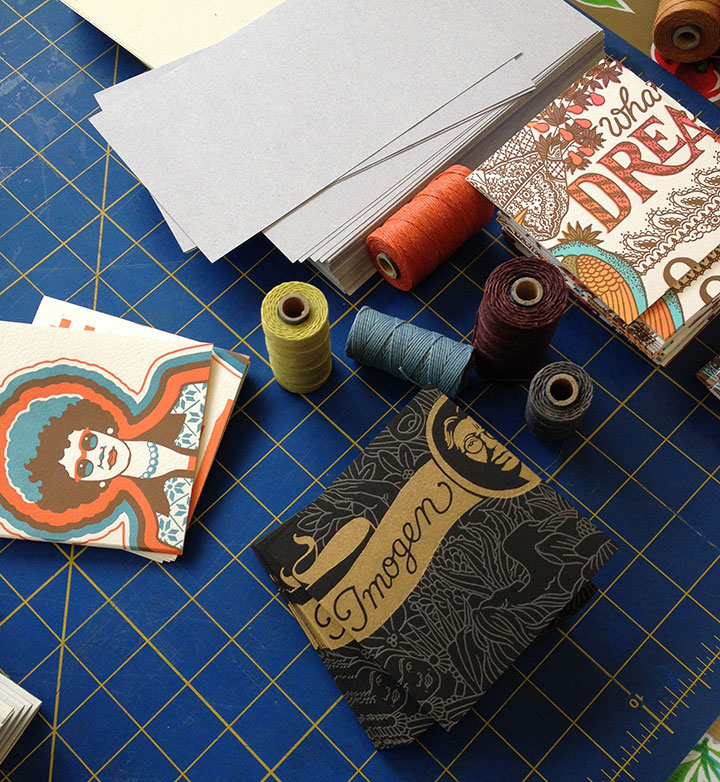
Photo by Jessica Spring
Jessica has been churning out a crop of lemonade journals lately, including some fun new ones from the outtakes of our Focal Point print. Look for them soon in the shop!

Photo by Jessica Spring
Jessica has been churning out a crop of lemonade journals lately, including some fun new ones from the outtakes of our Focal Point print. Look for them soon in the shop!
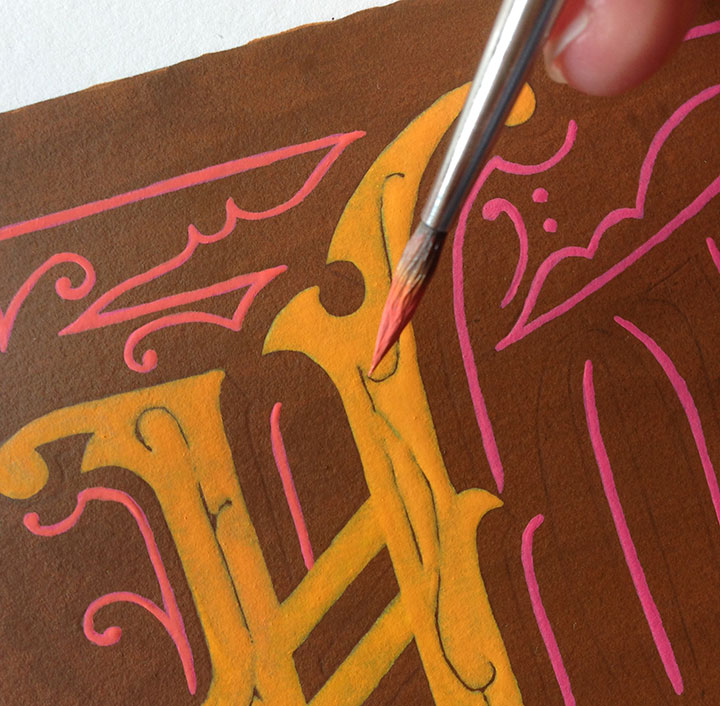
I’ve been working on a super-fun lettering commission lately, which has been giving my paintbrush plenty of exercise.
My client gets to see the finished paintings first, but once she does, I’ll post them here.
More soon!
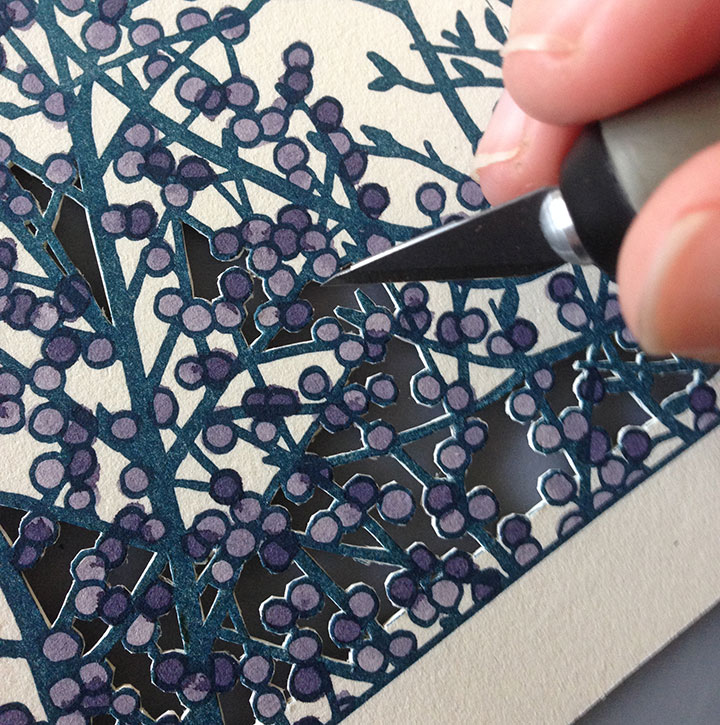
Much as I’d love them to be done by now, there’s still about a zillion flats to be cut for my Local Conditions book. I can’t do them all in one go—all that hand-Xacto-knifing is really hard on your hands. So I fit the cutting in wherever I can, whenever I need a break from some other project or process. Still, even though the progress is slow, it feels good to see a whole stack of finished pieces, ready to contribute to the edition.
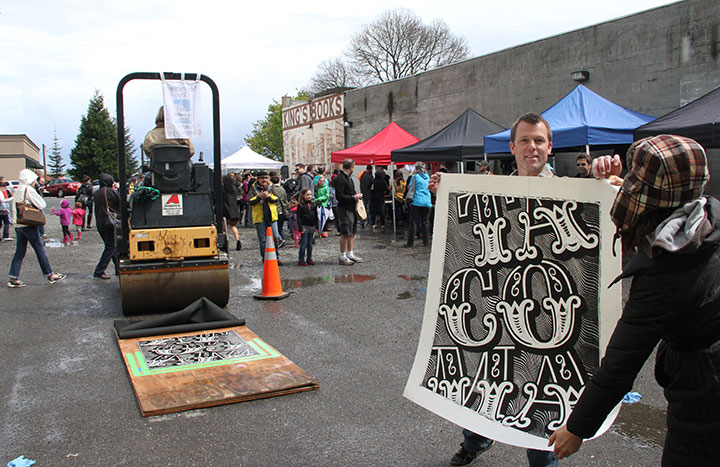
Don’t be distracted by Ric’s smile—see the puddles everywhere? See the winter gear people are wearing? Sunday was the craziest Wayzgoose yet, hands down. That’s because we had both the biggest crowd ever and the worst weather imaginable. So that smile is one of triumph: getting a decent steamroller print that day required beating some serious odds.
It rained sideways while Jessica inked.
It hailed while we lined up our block.
Photo by Dr. Jamie Brooks
It froze while we peeled our prints up.
Photo by Dr. Jamie Brooks
It blew a gale while I painted.
Still, despite the mishaps, I think it turned out alright. Jessica and I are calling our print “Park Place”—created in gratitude over the passage of a bond that would fund our city park system. The map in the center shows most of Tacoma’s parks, with twelve of our favorites called out like properties on a Monopoly board.
We even took a snippet of the illustration and sent it over to the talented screenprinting booth folks, who turned it into a t-shirt design during the event (you can just see a peek of it in the upper left corner).
Since the rain and wind prevented us from hanging the finished prints outside during Wayzgoose, most of the people who came that day didn’t get to see anybody’s finished print. So today Ric, Jessica and I remedied that.
Thanks to Spaceworks Tacoma, all of this year’s steamroller prints are on exhibit in the Woolworth Windows downtown…
…where you can see them—in fair weather or foul—now through August 21.
Thanks to everyone who visited or volunteered at Wayzgoose this year, and to King’s Books and the Tacoma Arts Commission for making it all happen!
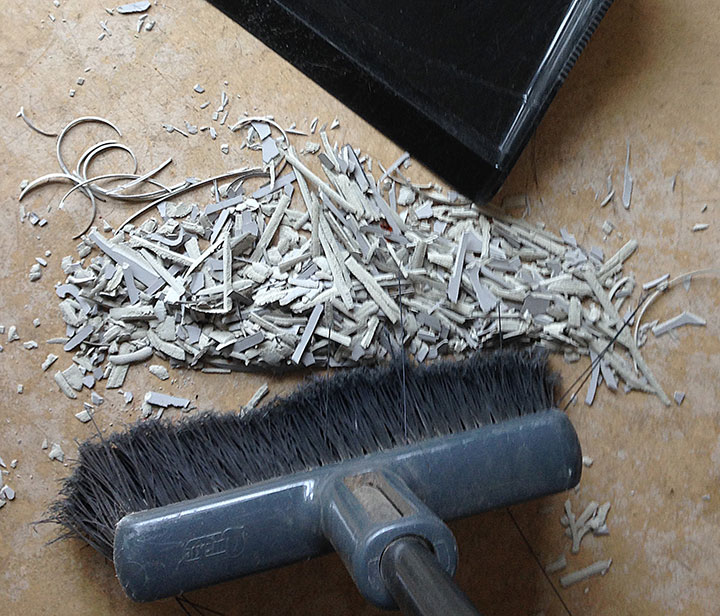
The carving is done, and we can’t wait to show you the finished product. See you at the Wayzgoose on Sunday!
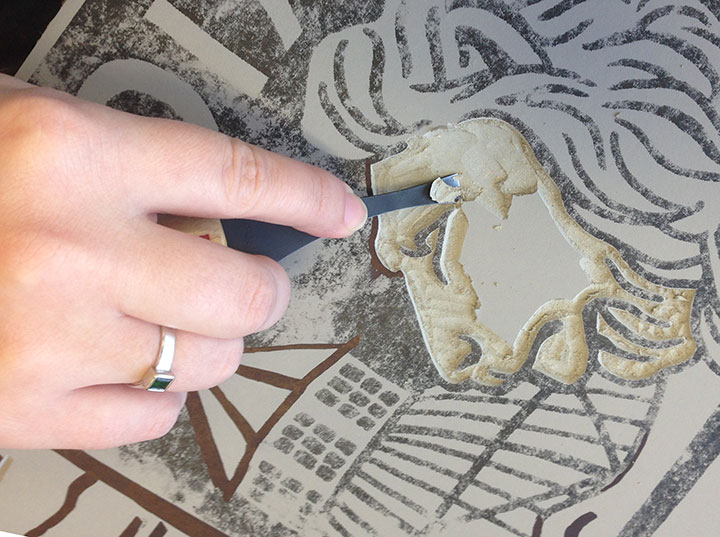
Here we are: year ten. Since the time Jessica Spring founded the Tacoma Wayzgoose all those years ago, it’s become one heckuva beast—and a veritable Tacoma institution.
So here are a few sneak peeks of the giant linoleum block Jessica and I are carving—and we’ll reveal all on Sunday:
10th Annual Tacoma Wayzgoose
Sunday, April 27, 2014
11 am to 4 pm, Free!
King’s Books
218 St. Helens Avenue, Tacoma, WA
If you’re new here and don’t know what a Wayzgoose is, or you just want to relive the glory days of old, here are links to all the Wayzgeese (gooses?) I’ve been a part of:
• 2009 (Tacoma)
• 2010 (Tacoma)
• 2011 (Tacoma)
• 2011 (San Francisco)
• 2012 (Tacoma)
• 2013 (Tacoma)
Itching for more? Well, then, see you on Sunday!
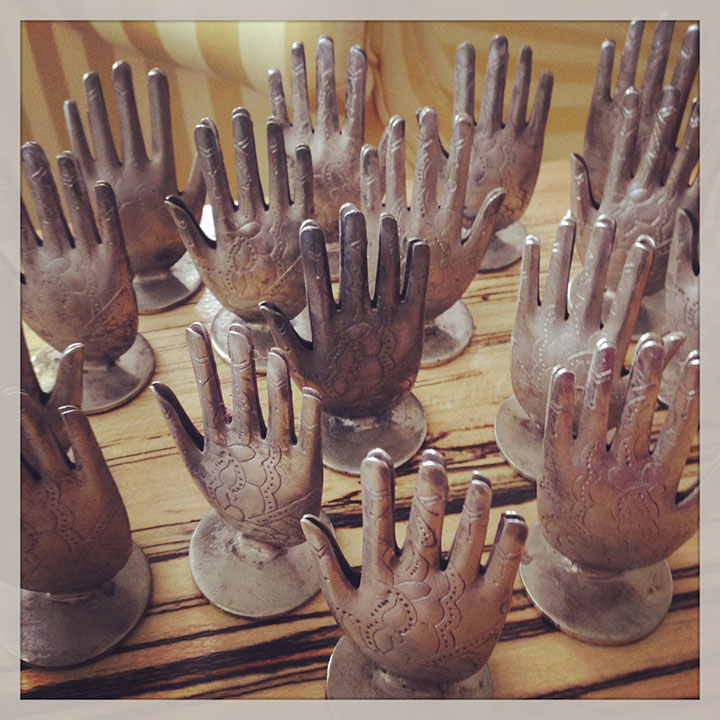
I picked up a whole passel of display fixtures this week—just in case I need a helping hand (or 12) at my next craft fair table…
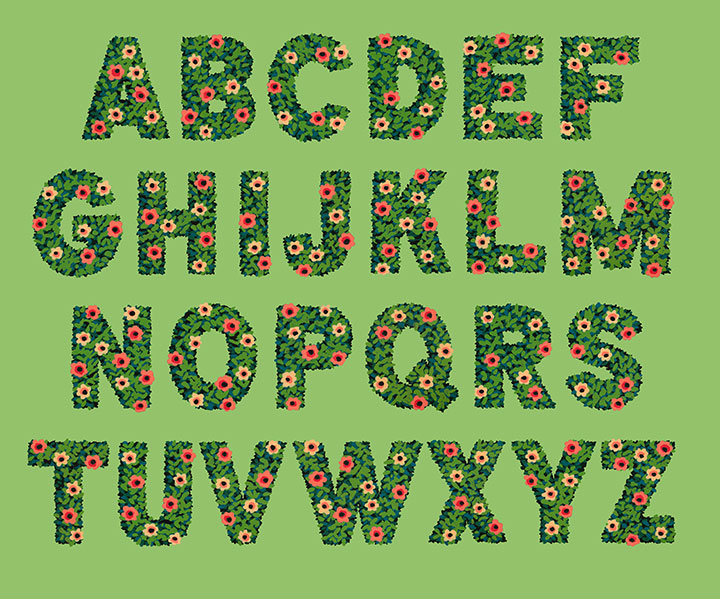
Look! I made an alphabet!
It’s funny—I almost never design an entire alphabet. In general, lettering projects just don’t really work like that. Most of the time, a letterer(erer) designs only the letterforms required for the word or phrase they’re lettering. That’s really the best way to create letter styles (which are not the same as fonts!) that really fit what the text is trying to “say.” You’re not designing an alphabet and then making it work for a bit of text—you’re taking that bit of text and giving it a voice.
But this time, I did things differently. I wanted to create some botanical lettering, but I wasn’t sure what I wanted to use it for—so I went whole hog and started with the entire alphabet.
Lately I’ve been doing a lot of work with a new (to me) medium: acrylic ink. It’s what I used to create the You’ll Like Tacoma and Love Birds series. What I love about acrylic ink is that unlike watercolor, it’s opaque—and infinitely easier to wrangle than the more traditional opaque medium of gouache.
When you work with watercolor alone, you have to start with the lightest colors first, and build up darker ones in layers. Whites are the white of your paper, and once you add pigment to an area, you can never return back to that pristine white. It teaches you to think in a subtractive sense, where you sort of “cordon off” the areas you want to stay white, and carefully build everything else up around them. I love working with watercolor, but it takes years and years of practice to feel proficient at it, and it’s not a medium that’s forgiving of mistakes.
I find opaque media to be far more freeing, and the look more crisp. (I also like to combine acrylic ink with watercolor in the same painting—the best of both worlds!) But what I love best about it is that I don’t have to work from light-to-dark—I can go in reverse! Many of the mid-century illustrators I admire (Mary Blair, Eyvind Earle, Walt Peregoy, Ralph Hulett, etc.) painted with opaque media, so I looked at a lot of landscape paintings done for animation backgrounds for clues on technique. That’s when I figured it out: dark-to-light, not light-to-dark.
For my alphabet, I started with a black hedge silhouette, and added leaves (above) in increasingly lighter greens and blues. I think by the end there were 9 or 10 layers of paint in the finished lettering.
I was so grateful for the epiphanies Earle and Hulett had given me that suddenly, what I wanted to do with the alphabet became clear: thank-you cards!
To hedge my bets (sorry) I’ve packaged them up both individually and in pretty little box sets of 8. You can find yours in the shop!
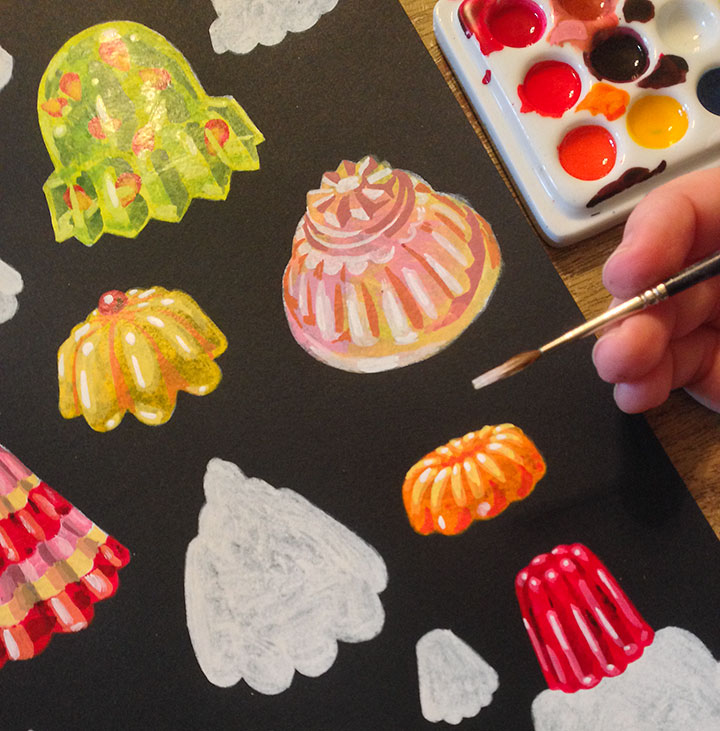
You already know I have a thing for absurd, elaborate, apocalypse-resistant desserts. I took an afternoon “off” from my normal studio work to play around with various silly things, and this ended up being the theme.
I think it’s sort of an illustrator’s version of happy hour, I suppose…
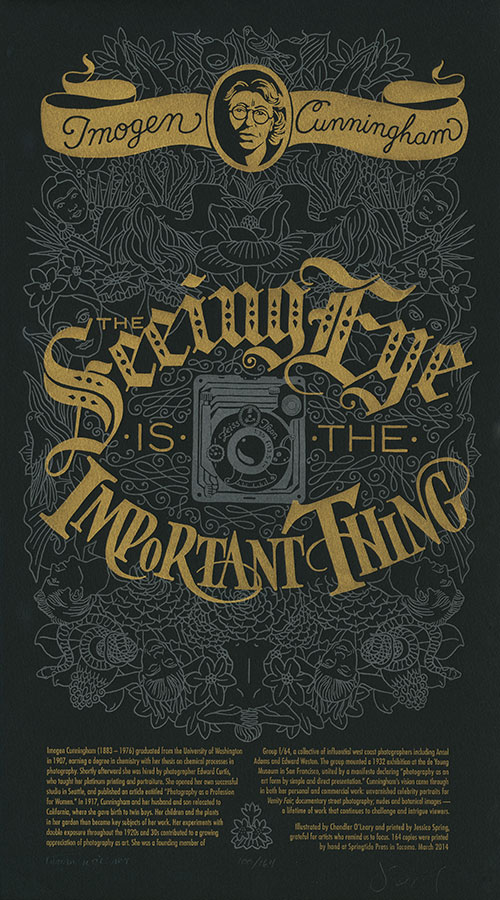
If you earn your living by drawing pictures, you have to spend a lot of time with your head down and your eyes on your paper. Yet at this time of year, with spring coming along fast (at least in the Northwest…), life hurries by at a frantic pace. I hate the idea of missing any of it—so I’m always happy for any reminder to stop and really look around me. So for our newest Dead Feminist broadside, we’re heeding the words of one of America’s greatest photographers:
The seeing eye is the important thing. — Imogen Cunningham
This piece is a major departure from what we’ve done in the past—as you can plainly see. For the first time ever we’ve printed the broadside on black paper—which helped us “pull the focus” (if you will) onto the quote. It also provided a beautiful backdrop for a tribute to someone who spent her life creating black-and-white images.
Surrounding the quote is an intricate metallic silver filigree of spring botanicals and portraiture, creating a pastiche of the subjects of some of Imogen Cunningham’s most iconic photographs—while the color choice references the traditional silver-gelatin photographic process. In the eye of the storm of imagery is the all-seeing camera lens, looking out onto the world.
Jessica has her own secret-sauce recipe for gold ink, and while we’ve used it before in our series (like in Gun Shy), nothing makes it look so fabulous as a dark background. The gold ink looked amazing on press—we kind of wished we could just leave the ink on there permanently, because that’s some serious bling. (It almost made the Vandercook feel like some sort of super-cool Bond gadget.)
As always, we donate a portion of the proceeds of the series to a nonprofit that aligns with the message of each piece. To help sharpen the seeing eyes of the artists of tomorrow, this time we’ve chosen Youth in Focus — a nonprofit that puts cameras in the hands of at-risk youth to “teach them how to develop negatives into positives.”
• • • • • • • • • • • • • • • • • • • • • • • • • • • • • • • • • • • • • • • • • • • • • • • • • • • • • • • • • • • •
Focal Point: No. 19 in the Dead Feminists series
Edition size: 164
Poster size: 10 x 18 inches
Printed on an antique Vandercook Universal One press, on archival, 100% rag (cotton) paper. Each piece is numbered and signed by both artists.
Colophon reads:
Imogen Cunningham (1883 – 1976) graduated from the University of Washington in 1907, earning a degree in chemistry with her thesis on chemical processes in photography. Shortly afterward she was hired by photographer Edward Curtis, who taught her platinum printing and portraiture. She opened her own successful studio in Seattle, and published an article entitled “Photography as a Profession for Women.” In 1917, Cunningham and her husband and son relocated to California, where she gave birth to twin boys. Her children and the plants in her garden then became key subjects of her work. Her experiments with double exposure throughout the 1920s and 30s contributed to a growing appreciation of photography as art. She was a founding member of Group f/64, a collective of influential west coast photographers including Ansel Adams and Edward Weston. The group mounted a 1932 exhibition at the de Young Museum in San Francisco, united by a manifesto declaring “photography as an art form by simple and direct presentation.” Cunningham’s vision came through in both her personal and commercial work: unvarnished celebrity portraits for Vanity Fair; documentary street photography; nudes and botanical images — a lifetime of work that continues to challenge and intrigue viewers.
Illustrated by Chandler O’Leary and printed by Jessica Spring, grateful for artists who remind us to focus.
Available now in the Dead Feminists shop!